
After the
war, due to the political conditions, no expeditions were
made to Karakorum until 1953 when the Americans again headed
for K2. The expedition consisted of eight men, including the
veterans Houston and Bates (from the 1938 expedition), Tony
Streather (who 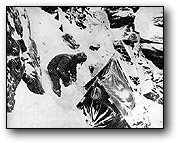 had
been with the Norwegians on Tirich Mir in 1950) and George
Bell (famous for his climbs in the Andes) in the front line. had
been with the Norwegians on Tirich Mir in 1950) and George
Bell (famous for his climbs in the Andes) in the front line.
On June 19, Base Camp is established below the Abruzzi-Spur
at 5,000 metres. The expedition didn't have any Sherpas
since they had been denied entrance to Pakistan, they had to
manage with carriers from the Hunza-people, who did show
climbing talent. During the following three weeks the Camps
were established - mainly in the same places as in 1938 and
1939. The weather looked good, but slowly turned. Suddenly
storm winds became common, and all climbing activity was
stopped for several days.
Finally, on August 1, the entire eight man team was together
in Camp VIII at 7,750 metres, all in their very best shape
and ready for the final attack.
Then the
Gods of the mountain attacked! A violent snowstorm started
to rage day and night. Thanks to Houston they had supplies
for 10 - 12 days. A vote was taken, and two rope-teams were
chosen for the attack against summit. All they needed was a
few days of good weather. However, the storm never calmed
down. Instead, the wind increased, shaking the tents more
and more. On August 4 the 26-year-old Gilkey suffered a
thrombus in one of his legs, it was almost impossible for
him to move. His condition deteriorated and also his lungs
were attacked after a few days. In the raging storm there
was no possibility to get him down quickly to Base Camp -
most probably, it would have been difficult to transport him
at all.
Now it was a
fight for everybody's life. It was clear that the storm
would continue for some 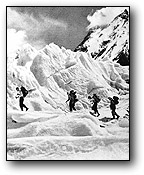 time.
On August 10, the situation got critical in the highest
camp. There were almost no supplies left and Gilkey's
condition was very serious. Bell had also lost the feeling
in his toes. time.
On August 10, the situation got critical in the highest
camp. There were almost no supplies left and Gilkey's
condition was very serious. Bell had also lost the feeling
in his toes.
It was
decided to make an attempt to get Gilkey down and the whole
crew started to descend. There was no alternative anymore if
they wanted to survive. The first day they only managed a
few hundred metres downwards. In the evening the ropes
entangled between the different rope-teams and five men
fell, but Schoening managed to hold them alone! Fortunately
no one got seriously injured. While the bivouac tents were
put up, Gilkey had been secured a bit away. When went back
to him, an avalanche had decided his destiny, nothing is
left, his provisional stretcher attached with ice axes had
been torn away, and in the howling storm nothing could be
heard. The other seven climbers continued their struggle
downward and finally they reached Base Camp after five days.
Bell had serious frostbite to his feet and was carried all
the way to Skardu - almost 200 kilometres.
The third
American expedition had again been close to success. That
all seven climbers managed to get down the steep Abruzzi-Spur
under such adverse circumstances was literally more than a
miracle!

1953
Italian Professor Ardito Desio and Mario Puchoz scouted the
terrain, seeking possible routes up K2. They probed the
terrain up to 6,000 metres and made a lot of observations.
When Desio got home, he made the final plans 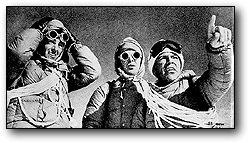 to reach the summit. He said that the only chance of
succeeding depended on the the plan being followed with a
military discipline and that every member was to leave his
personal ambition for the expeditions best.
to reach the summit. He said that the only chance of
succeeding depended on the the plan being followed with a
military discipline and that every member was to leave his
personal ambition for the expeditions best.
The 21 chosen members first had to pass through a medical
examination and were tested in a pressure chamber. In the
middle of January 1954, all members gathered in a tent camp
at 4,000 metres altitude on the Mount Blanc massif. The
oxygen devices were tested and every person's physical and
mental condition was examined in detail. From this group, 10
men were chosen for the expedition. They immediately leave
for a training camp on 4,500 metres on Monte Rosa.
Just before
the departure, a few men joined the party since the
expedition failed to recruit any Sherpas. At the last minute
the famous mountain guide Cassin resigned his alpine
leadership.
The Approach
followed the schedule and the route is the same as before,
through the Abruzzi-Spur. Despite the bad weather, the
higher camps were established one after another.
In the
middle of June, all supplies for the final attack were
stored in Camp IV. The expedition hoped to reach the summit
before the end of the month. Hard winds and storms raged all
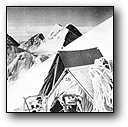 over
Karakorum during the following weeks and no progress was
made. Would they not reach higher than their fellow
countrymen from 1929? (The expedition from which Desio is a
veteran). over
Karakorum during the following weeks and no progress was
made. Would they not reach higher than their fellow
countrymen from 1929? (The expedition from which Desio is a
veteran).
The hard
winds and storms calmed during the second half of July and
the weather seemed to stabilise. Desio decided to take this
opportunity as a last chance to reach the summit before the
monsoon. Camp V was established at 7,300 metres and the next
300 metres above. At this point, an unfortunate thing
happened: the 36 year old mountain guide Maria Puchoz from
Courmayeur died of pneumonia in Camp II on July 20.
The
expedition continued and Camp VIII was pushed forward to
8,150 metres, right below the 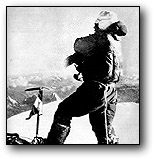 200
metre high and steep wall that is considered to be the
climb's key to success. On July 28, four men reached Camp
VIII in the evening and spent the night there. Of these
four, two climbed on towards the summit next morning. Up on
the ridge, just 200 metres below the top the oxygen suddenly
ran out. What to do? Continue or descend? They continued
without oxygen and finally reached the summit in the
afternoon after a hard struggle. K2's summit is reached for
the first time. They didn't stay long. The descent became
dramatic when one of the companions fell but managed to stop
the fall with his ice axe and his partner's safety. At 2:30
p.m. the duo reached Camp VIII where their friends welcomed
them with hot drinks. Everybody safely reached Base Camp on
August 2. 200
metre high and steep wall that is considered to be the
climb's key to success. On July 28, four men reached Camp
VIII in the evening and spent the night there. Of these
four, two climbed on towards the summit next morning. Up on
the ridge, just 200 metres below the top the oxygen suddenly
ran out. What to do? Continue or descend? They continued
without oxygen and finally reached the summit in the
afternoon after a hard struggle. K2's summit is reached for
the first time. They didn't stay long. The descent became
dramatic when one of the companions fell but managed to stop
the fall with his ice axe and his partner's safety. At 2:30
p.m. the duo reached Camp VIII where their friends welcomed
them with hot drinks. Everybody safely reached Base Camp on
August 2.
.
Who were the
two climbers that reached the summit? It wasn't made public
until the expedition came back to Italy. Desio wanted
everyone to have the credit; the whole team was responsible
for the success. The ascenders were Lino Lacedelli and
Achille Compagnoni.
If you like this article, you can find more like it at http://www.jerberyd.com/climbing/stories/k2
|